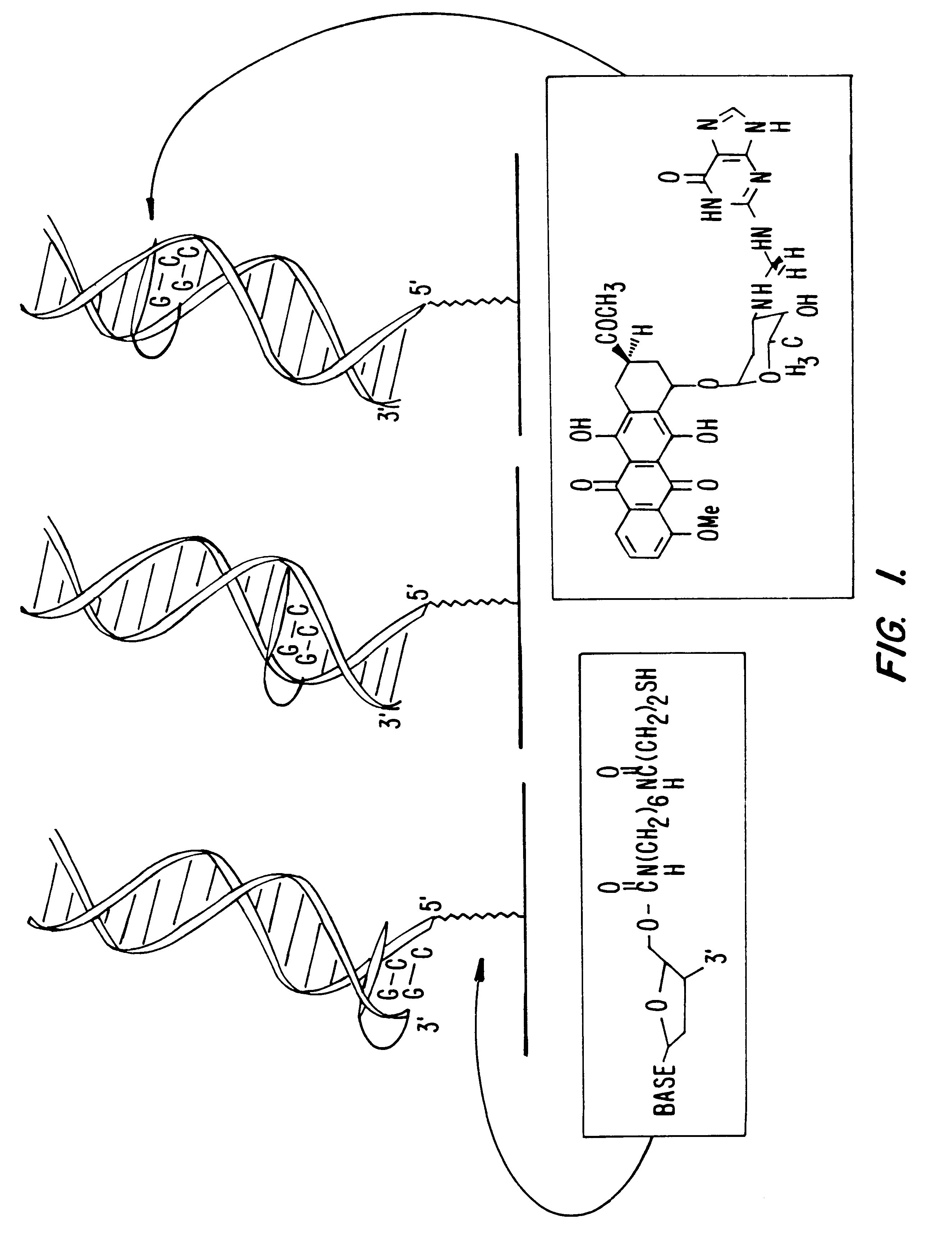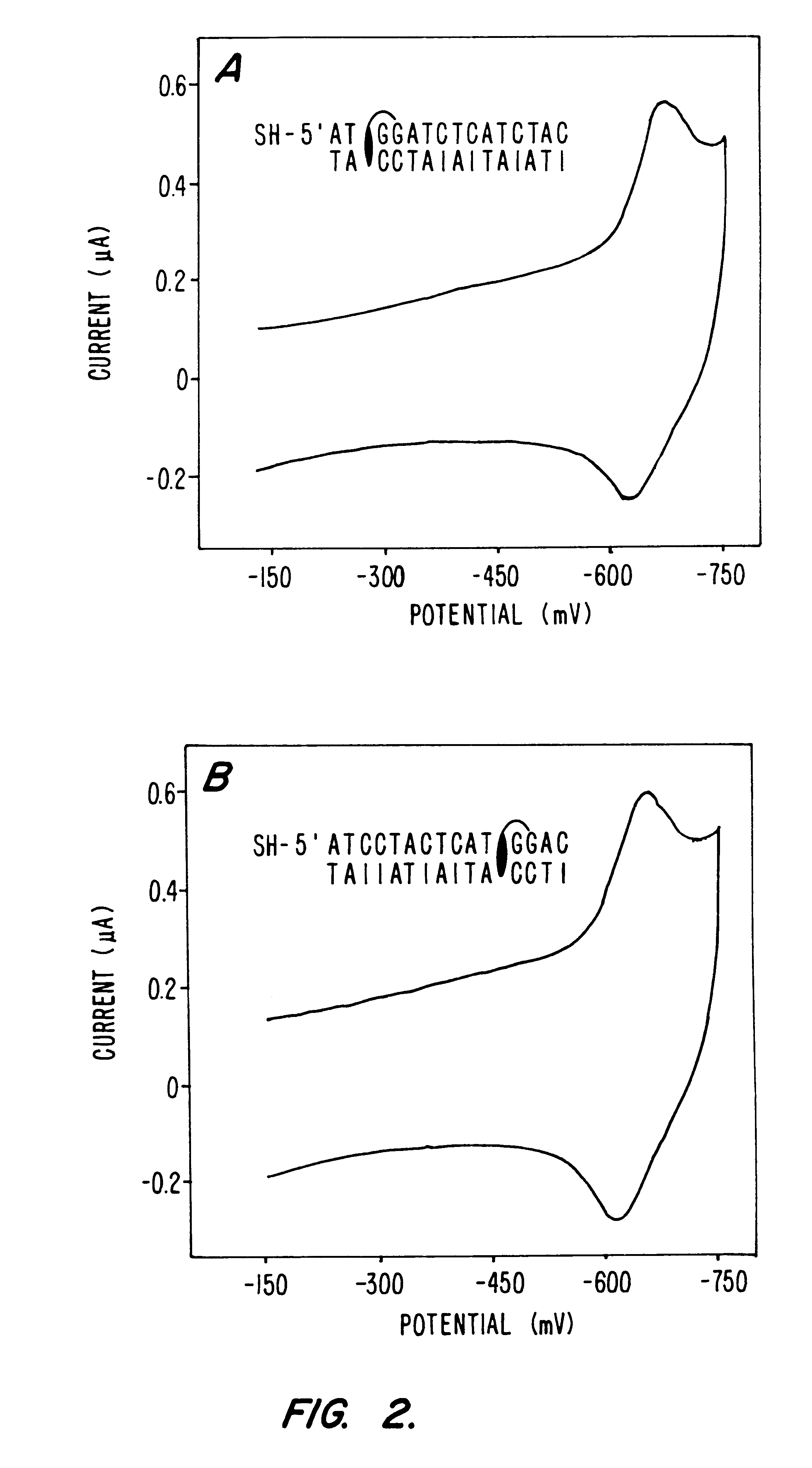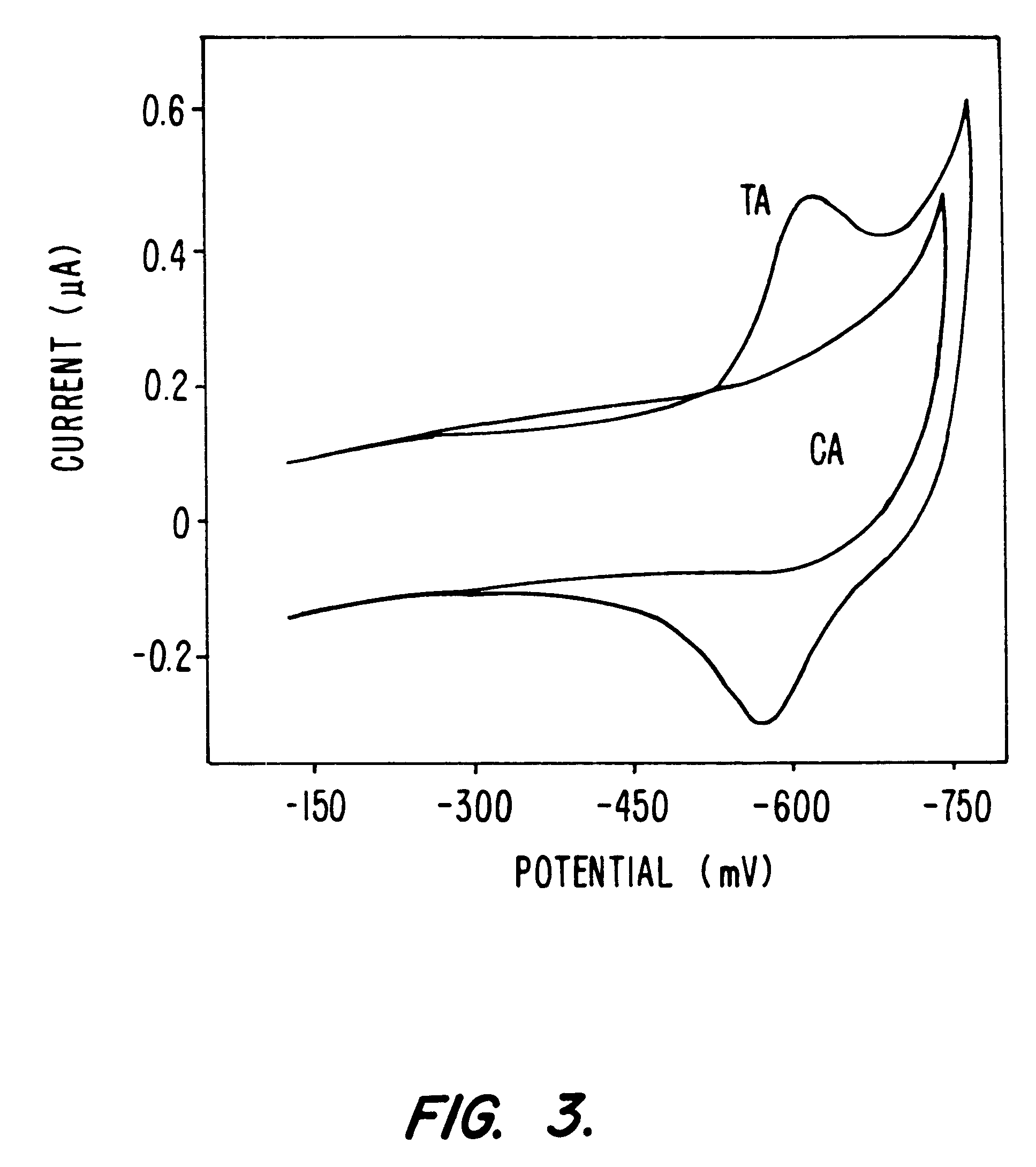Electrochemical sensor using intercalative, redox-active moieties
a technology of redox-active moieties and electrochemical sensors, applied in the field of electrochemical sensors using intercalative and redox-active moieties, can solve the problems of mismatch at the mutated site, severe consequences, and limited usefulness of a particular system for detecting materials of interest,
- Summary
- Abstract
- Description
- Claims
- Application Information
AI Technical Summary
Problems solved by technology
Method used
Image
Examples
example 1
Site-specific Incorporation of a Redox-Active Intercalator into a DNA Duplex
The redox-active intercalator daunomycin (DM) (Arcamone, 1981) was incorporated into the DNA duplex to investigate charge transduction through these duplexes (FIG. 1). DM undergoes a reversible reduction (Molinier-Jumel, 1978; Berg, 1981) within the potential window of the monolayers (Kelley, 1997a), and covalent adducts of intercalated DM crosslinked to the 2-amino group of guanine (Leng, 1996) have been crystallographically characterized within duplex DNA (Wang, 1991). Thus, a series of oligonucleotides primarily containing A-T or inosine (I)-C pairs were constructed with discrete guanine binding sites to which DM was crosslinked. Preferably, thiol-terminated duplexes (0.1 mM) containing an adjacent pair of guanines were hybridized, incubated with 0.2% formaldehyde and 0.2 mM DM in 5 mM phosphate, 50 mM NaCI, pH 7 for 1 h, and phenol extracted to remove excess DM.
Moving the guanine site along the duplex re...
example 2
Characterization of DNA Duplexes Modified with a Redox-Active Intercalator
Modified duplexes were characterized by mass spectrometry, ultraviolet / visible absorption spectroscopy, and thermal denaturation experiments, all of which were consistent with a 1:1 DM-duplex (SEQ ID NO:3)stoichiometry. For example, the duplex SH--(CH.sub.2)CONH(CH.sub.2).sub.6 NHCO.sub.2 --- .sup.5' ATCCTACTCATGGAC with its inosine complement (SEQ ID NO:4; .sup.5' TTCCATTATTATTAT) modified with DM was analyzed by MALDI-TOF spectrometry. Mass-to-charge ratios (found / calc) of 5284 / (5282) (DM+SH strand), 4541 / (4540) (complement), and 4742 / (4742) (SH strand) were detected. These values correspond to the calculated masses for fragments expected from this duplex. UV-visible absorption spectroscopy also revealed a 1:1 duplex / DM stoichiometry based upon comparison of the duplex absorbance at 260 nm (M=14.9.times.10.sup.3 M.sup.-1 cm.sup.-1) and the absorbance of intercalated DM at 480 nm (M=5.1.times.10.sup.3 M.sup.-...
example 3
Preparation of Gold Electrodes Derivatized with DNA Duplexes
Electrodes were conveniently prepared by modifying gold surfaces with 15 base-pair DNA duplexes derivatized at the 5' end with a thiol-terminated alkane chain. Bulk gold electrodes were polished successively with 0.3-and 0.5-.mu.M alumina (Buhler), sonicated for 30 min, and etched in 1.0 M sulfuric acid. Au(111) surfaces were prepared by vapor deposition onto mica or glass (Widrig, 1991; Zei, 1983). Electrodes were then modified by incubation in 0.1 mM solutions of derivatized DNA duplexes in 5 mM phosphate / 50 mM NaCl (pH 7) for 12-48 h at ambient temperature. Modified electrodes were rinsed in buffer prior to use.
Before deposition of the duplexes onto the gold surfaces, the presence of the free thiols was confirmed using a spectroscopic assay based on dithionitrobenzene (Riddles, 1979). Subsequently, the samples were deposited onto the gold surfaces for 12-24 h.
Electrochemical assays, radioactive tagging experiments, and a...
PUM
| Property | Measurement | Unit |
|---|---|---|
| Transport properties | aaaaa | aaaaa |
Abstract
Description
Claims
Application Information
 Login to View More
Login to View More - R&D
- Intellectual Property
- Life Sciences
- Materials
- Tech Scout
- Unparalleled Data Quality
- Higher Quality Content
- 60% Fewer Hallucinations
Browse by: Latest US Patents, China's latest patents, Technical Efficacy Thesaurus, Application Domain, Technology Topic, Popular Technical Reports.
© 2025 PatSnap. All rights reserved.Legal|Privacy policy|Modern Slavery Act Transparency Statement|Sitemap|About US| Contact US: help@patsnap.com



